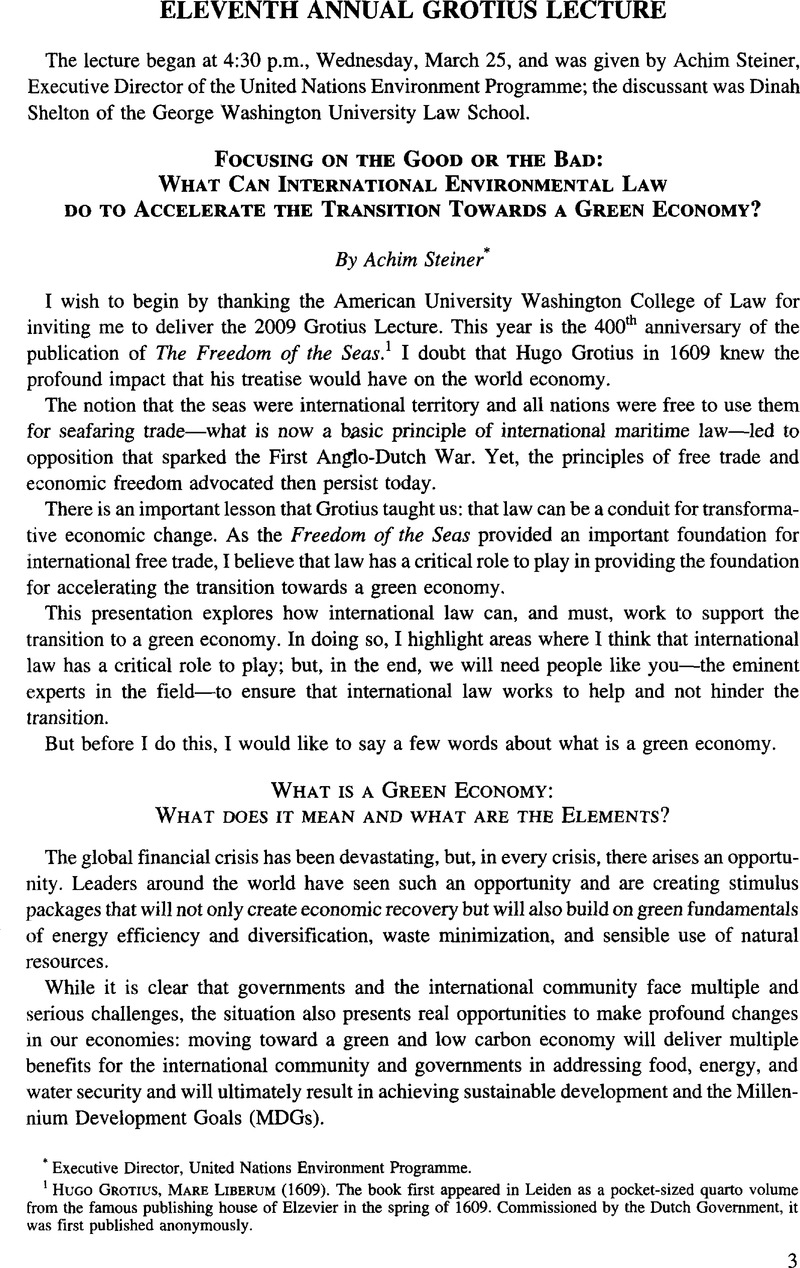Article contents
Focusing on the Good or the Bad: What Can International Environmental Law do to Accelerate the Transition Towards a Green Economy?
Published online by Cambridge University Press: 28 February 2017
Abstract

- Type
- Eleventh Annual Grotius Lecture
- Information
- Copyright
- Copyright © American Society of International Law 2009
References
1 Hugo Grotius, Mare Liberum (1609). The book first appeared in Leiden as a pocket-sized quarto volume from the famous publishing house of Elzevier in the spring of 1609. Commissioned by the Dutch Government, it was first published anonymously.
2 UNEP, Globalization and the Environment—Global Crises: National Chaos?, presented to the twenty-fifth session of the UNEP Governing Council, UNEP/GC.25/16 (Dec. 24, 2008).
3 UNEP, The Economics of Ecosystems & Biodiversity (2008); UNEP, Reforming Energy Subsidies Opportunities to Contribute to the Climate Change Agenda (2008).
4 Franklin Roosevelt, Address at the Democratic National Convention Accepting Party Nomination for U.S. Presidential Election (July 2, 1932).
5 UNEP, A Global Green New Deal (Feb. 2009), available at http://www.unep.org/greeneconomy/.
6 The Clean Development Mechanism: An Assessment of Current Practice and Future Approaches for Policy (Environmental Change Institute Oxford, Tyndall Centre for Climate Change Research, Working Paper No. 114. Oct. 2007).
7 United Nations World Commission on Environment and Development, Our Common Future (1987).
8 Al Gore, Earth in the Balance: Ecology and the Human Spirit (1992).
9 Jacobs, Michael, The Green Economy: Environment, Sustainable Development and the Politics of the Future (1991)Google Scholar.
10 Millennium Ecosystem Assessment, Ecosystems and Human Well-Being: A Framework for Assessment (2005).
11 UNEP, Reforming Energy Subsidies: Opportunities to Contribute to the Climate Change Agenda (2008).
12 See DOHA Declaration, WT/MIN(01)/Dec/1 (Nov. 20, 2001).
13 Pascal Lamy, Address at the Informal Trade Ministers’ Dialogue on Climate Change in Bali (Dec. 2007), available at http://www.WTO.org/english/news_e/sppl_e/sppl83_e.htm.
14 Kelsen, Hans, General Theory of Law and State 380 (1999)Google Scholar.
15 See Gordon Brown, Address on Climate Change (Nov. 19, 2007), available at http://www.numberlO.gov.uk/Page13791.
16 Louis Schwartz, China ‘s New Generation: Driving Domestic Development, Renewable Energy World.com (Mar. 10, 2009), http://www.renewableenergyworld.com/rea/news/article/2009/03/chinas-new-generation-driving-domestic-development.
17 UNEP, supra note 2.
18 UNEP, Global Green New Deal Policy Brief Launched in Run Up to Crucial G20 Meeting (Mar. 9, 2009), available at http://www.grida.no/ne’ws/press/3544.aspx.
19 Id.
20 See G.A. Res. A/RES/53/242 (Aug. 10, 1999).
21 This raises the related question of what a future country-responsive system of international environmental governance would look like.
- 1
- Cited by




